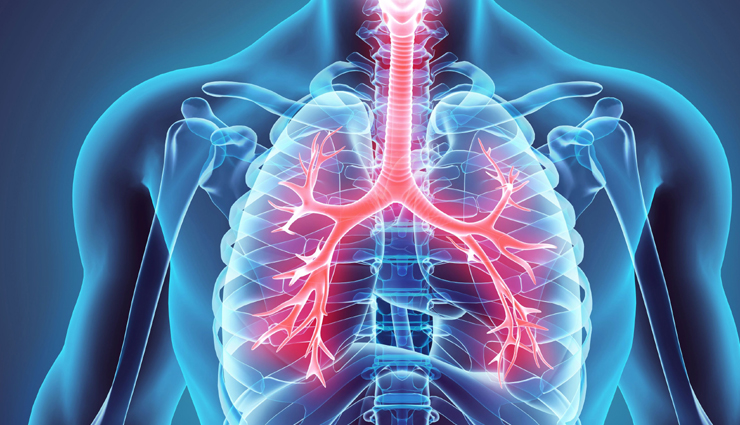10 Common Foods That Can Damage Your Lungs

For this reason, you should not give them up completely but consume them in a restricted manner. Here’s a list of some common food choices that can damage your lungs.

The Western diet that is prevalent in developed countries is characterized by a high intake of refined grains, high-fat dairy products, cured and red meats, and desserts/sweets while running low on fruits and vegetables. It is considered bad for the lungs and your overall health.
This high-calorie diet is associated with obesity and a high BMI. If you are obese, the dietary intake of lipids will increase the amount of free fatty acids in your bloodstream and thereby activate certain immune responses that will trigger increased inflammation, both bronchial and systemic.
Adipose tissue-derived immunological changes that cause metabolic effects contribute to the link between asthma and obesity. Over nutrition and the resulting obesity are also linked with asthma.
Studies have found a strong association between the intake of a Western diet and the development or worsening of respiratory conditions.
High consumption of processed meat (bacon, gammon, ham, corned beef, spam and luncheon meat, sausage, and meat pies) is associated with reduced lung function and an increased risk of COPD.
In addition, most cured meats such as bacon, cold cuts, ham, and hotdogs contain additives called nitrates and nitrites. Nitrates are often added to food for color or to extend shelf life due to its potential antimicrobial property.
Nitrites generate reactive nitrogen species, including nitrogen dioxide, nitrosonium, and dinitrogen trioxide, which may cause nitrative and nitrosative stress in the lungs.
The damage that these reactive nitrogen species cause to the lungs leads to pathologic lung changes consistent with emphysema.
Nitrates increase the risk of COPD-related hospital readmissions. Experiments in animal models performed almost 40 years ago showed that the ingestion of sodium nitrite and inhalation of nitrogen dioxide (a nitrite precursor) could be damaging to the lungs.
Taking vitamin B12 and B6 supplements were previously thought to protect against cancer but were later associated with a two- to fourfold increase in lung cancer risk.
Observational data suggest that B6 and B12 supplements may be associated with an increased risk of lung cancer among men, especially for adenocarcinoma and small-cell carcinoma, with no association seen for squamous cell carcinoma.
Both B6 and B12 occur naturally in meat, liver, eggs, and milk. While a multivitamin tends to stay close to the recommended daily allowances, supplements containing only B12 or B6 go well beyond the recommended dose.
Doses of vitamins in pill form may be harmful. For instance, researchers hoping to reduce the risk of lung cancer in heavy smokers gave them beta carotene supplements. Results showed the supplements actually increased the risk of cancer in smokers.
Low-to-moderate alcohol consumption has been associated with improved lung function, whereas excessive intake has detrimental effects.
The alcohol consumption pattern is strongly associated with impaired lung function, especially in women.
Salt causes water retention in the body, thereby making you feel bloated and increasing your weight, which is termed as water weight gain.
More importantly, the excess fluid can build up in the lungs and cause breathing problems in people with heart, kidney, and liver diseases.
Studies have shown an inverse association of lung function with potassium and sodium levels. This means the lower the levels of these minerals in the blood, the better your lung function.
Consuming excessive amounts of salt increases blood pressure within the blood vessels of the body. People with high blood pressure must try and limit their total daily intake of salt (sodium chloride) to no more than 2,500mg.
Dairy products can worsen symptoms of lung diseases. Milk is nutritious and filled with calcium. However, it also contains casomorphin, a breakdown product of milk, which has been known to increase mucus in the intestines.
During flare-ups, people with lung disease often experience an increase in mucus secretion.
Although the relationship is still unclear, scientists have stimulated mucus production from respiratory cells by adding casomorphin to them in the laboratory.
Food allergies can cause a severe, life-threatening reaction called anaphylaxis, which is characterized by a sudden drop in blood pressure and contraction of your airways, making breathing difficult.
The most common foods associated with such allergic symptoms are eggs, cow’s milk, nuts, soy, wheat, salads, fruits, and seafood such as fish, shrimp, and shellfish.
However, these foods only trigger allergic reactions in specific individuals, rather than everyone.
Food preservatives can trigger isolated asthma, especially sulfide additives, such as sodium bisulfide, potassium bisulfide, sodium metabisulfite, potassium metabisulfite, and sodium sulfide. These additives are commonly used in food processing and preparation.
Cruciferous vegetables, such as cabbage, broccoli, radishes, and cauliflower, are filled with nutrients and fiber. Fibers are hard to break down and usually produce a lot of intestinal gas during digestion.
The buildup of gas in the digestive tract usually triggers bloating and puts extra pressure on the diaphragm, which can make you feel short of breath. This can be especially hard for people with preexisting lung disease.
There is a ring of muscle forming a valve at the end of the esophagus. If the valve does not seal or opens too often, stomach acid can move into the esophagus. This creates heartburn, and frequent heartburn is a sign of acid reflux disease.
Acid reflux increases lung disease symptoms by irritating the airway and lungs that are in close proximity.
Limiting acidic foods and drinks, such as citrus, fruit juice, tomato sauce, coffee, and spicy foods, reduces acid reflux symptoms and, therefore, lung disease symptoms.